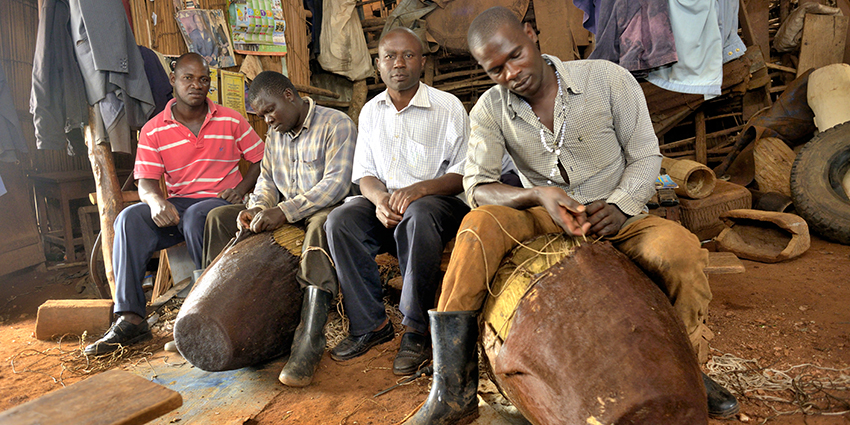Ugafode and the financial inclusion of refugees

Supported by the Grameen Crédit Agricole Foundation since 2015, UGAFODE Microfinance Limited is a microfinance institution that provides inclusive financial and non-financial services to low-income but economically active populations in Uganda. UGAFODE is one of three organizations supported by a program launched by the Foundation, the Swedish International Development Cooperation Agency (Sida), and the United Nations Refugee Agency to support the financial inclusion of refugees. With this financial and technical support, UGAFODE opened a branch in the Nakivale refugee camp in Uganda. A spotlight on an interview with Shafi Nambobi, Executive Director of UGAFODE.
1. In a few words, what is UGAFODE Microfinance Limited?
UGAFODE Microfinance Limited began in 1994 as an NGO specializing in group lending for women and has since evolved into a deposit-taking microfinance institution regulated by the Bank of Uganda. The institution specifically targets the country's low-income but economically active population through seven urban and 12 rural branches, serving over 110,000 savings clients and 8,000 credit clients. It offers a range of financial services including savings, loans, and money transfer services, with a loan portfolio of €12.1 million and savings volume of €6 million.
2. UGAFODE received innovative financial support from the Grameen Crédit Agricole Foundation, the Swedish International Development Cooperation Agency (Sida), and the United Nations Refugee Agency in 2019, when it was selected as a beneficiary of a program to support financial inclusion for refugees. Can you explain this initiative and the support UGAFODE received?
Most refugees have faced discrimination and have been denied credit facilities by financial institutions because they are considered too risky, despite being engaged in agriculture and retail. In March 2020, UGAFODE became the first financial services institution to establish a branch in a refugee camp in Uganda through this program. Nakivale refugee camp is the 8th largest camp in the world, hosting more than 134,000 refugees from 13 countries. The total project budget is €536,780, of which €396,882 comes from Sida and €139,810 from UGAFODE over three years. In addition, the Foundation also granted a new loan of €540,000 in July 2020, of which €50% will be used for the refugee program to provide loans to refugees and host populations.
3. What are the first results of the project?
The project has already begun to prove its worth. Since the opening of the Nakivale branch, 505 loans totaling €383,596 have been disbursed between March 2, 2020, and December 31, 2020, primarily to support small and medium-sized enterprises and individual agricultural loans. It is important to note that all of this was achieved in the context of the Covid-19 crisis. The portfolio at risk (PAR) is at 1.65% for 1 day and 0% for 30 days, which is both considerable and welcome. In addition, we have raised financial awareness among more than 5,000 refugees, and 2,534 clients have opened savings accounts totaling €65,112. A total of 5,301 refugees received €776,345 through the Nakivale branch's friends and relatives money transfer services in the nine months since the branch opened. We currently employ 21 people, including eight refugees in Nakivale and four at the Kampala call center, to handle customer complaints in the main refugee languages.
4. How has the Covid-19 pandemic affected the project? What measures have been taken to address the crisis?
The project was implemented and opened at the beginning of the Covid-19 crisis. As the government declared financial services essential, the Nakivale branch was able to offer the necessary services to its clients on a very positive note. UGAFODE was able to adjust its policies and procedures to serve refugees in compliance with regulatory guidelines. We recruited refugee staff at the call center to provide advice and information to clients. We also built a branch extension to provide sufficient space to ensure the safety of staff and clients. In addition, we provided loan rescheduling options to clients to support them during this time of crisis. The Grameen Crédit Agricole Foundation and KIVA also supported us in addressing the crisis. The Foundation granted us flexible budgetary allocations within main lines to cope with the uncertainties of the crisis. The branch is operating according to the Covid-19 Standard Operating Procedures (SOPs) established by the Ministry of Health and the Government. We will also be able to purchase three additional motorcycles to enable branch staff to reach more clients more easily and quickly.
5. What are the project priorities now?
There are three priorities:
- Intensify financial education training to reach at least 8,800 refugees and 8,000 host communities in the second year and 15,500 refugees and 14,000 host communities in the final year of the project.
- Conduct customer surveys to facilitate informed decision-making and develop refugee-friendly products.
- Roll out the project model in other settlements. After Nakivale, the project will be replicated as soon as possible in other refugee camps. Initial feasibility studies have been conducted for the Kyaka, Kyangwali, and Rwamwanja refugee camps.



Leave a Reply
Want to join the discussion?Feel free to contribute!